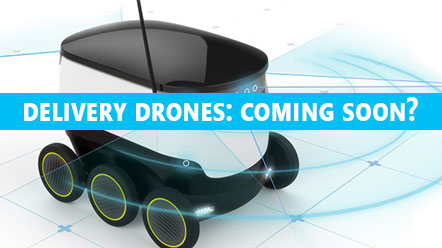
Companies from various sectors envision a future driven by artificial intelligence (AI) and automation. So far, much of the attention seemed focused on developing unmanned aerial vehicles.
But not every company looked only to the skies...some had more terrestrial ideas in mind.
Enter Starship Technologies, a start-up based in Estonia. The team at Starship created a line of autonomous ground based courier robots, or sidewalk delivery drones.
Ground-based delivery drones
In recent months, both Amazon and Fed-Ex previewed their ideas about the future of package delivery via aerial drones. But these efforts face many challenges, the foremost of which is regulation. Other obstacles include the roll-out of this technology on a nationwide basis requires mass investment as well as consumer uptake.
But there is little doubt that there is a strong appetite for reliable delivery solutions. And, finding an efficient way to automate the courier process is of great interest to numerous companies. Many companies are competing within this space to find the best solution.
On the other hand, sidewalk delivery drones are already legal in a number of states.
Starship Technologies focused on utilizing current infrastructure and new technologies, such as on-demand services, to bring goods to customers now.
To launch its sidewalk delivery drones, the start-up partnered with logistics company Postmates to deliver food in Washington D.C. Starship also partnered with on-demand restaurant delivery service, DoorDash, to service customers in Redwood City, Calif.
Starship calls its sidewalk delivery drone a “personal courier” and is designed to deliver small parcels within a 30-minute range. It is compact, about knee-high, and reaches speeds up to 4 miles per hour. For a delivery run, the personal courier travels on sidewalks and is outfitted with sensors and cameras so it can autonomously avoid obstacles. Customers access the contents of the delivery via an app.
Pilot programs already in progress
Starship's technology is already legal in a number of states. Currently, pilot programs are operating in Virginia, California and Washington.
In Virginia, the law allows the robots to operate on footpaths, sidewalks and crosswalks. The delivery drones are not permitted to travel over 10 mph and require remote access monitoring by operators. During the test phase, the delivery robots must make up to 10 deliveries a day and be accompanied by monitors to observe behavior and performance.
Starship’s pilot programs with DoorDash and Postmates provide real-world practice and help work out the kinks. So far, the process is pretty cut and dry.
A customer places an order, either online or via an app. The restaurant completes the order and loads the drone with the delivery. The drone proceeds to the delivery address.
Seasoned creators
Founders Ahti Heinla and Janus Friis Visualise are former Skype co-founders. Starship is just their latest start-up to gain mainstream recognition. So far, the start-up has received millions of dollars in backing from a number of Venture Capital investors.
In a sector that is still relatively young, Starship Enterprises has quickly become a pioneer in urban, on-demand delivery. Heinla and Visualise envision a future where delivery drones are a regular sight and responsibly share sidewalk space with pedestrians.
In addition to the pilot programs in Washington and Redwood, the start up has made deliveries in over 40 European cities including London, where Starship partnered with JustEat.
While Starship’s sidewalk delivery drones may not be the super speedy aerial solution that other retailers are seeking, the robots are currently a solid solution for deliveries in urban areas. Currently, these delivery robots are a great way to complement both human couriers and aerial drones, when they become approved.
For now, Starships’s sidewalk robots are rolling ahead in the delivery drone race.
 Companies from various sectors envision a future driven by artificial intelligence (AI) and automation. So far, much of the attention seemed focused on developing unmanned aerial vehicles.
But not every company looked only to the skies...some had more terrestrial ideas in mind.
Enter Starship Technologies, a start-up based in Estonia. The team at Starship created a line of autonomous ground based courier robots, or sidewalk delivery drones.
Companies from various sectors envision a future driven by artificial intelligence (AI) and automation. So far, much of the attention seemed focused on developing unmanned aerial vehicles.
But not every company looked only to the skies...some had more terrestrial ideas in mind.
Enter Starship Technologies, a start-up based in Estonia. The team at Starship created a line of autonomous ground based courier robots, or sidewalk delivery drones.

